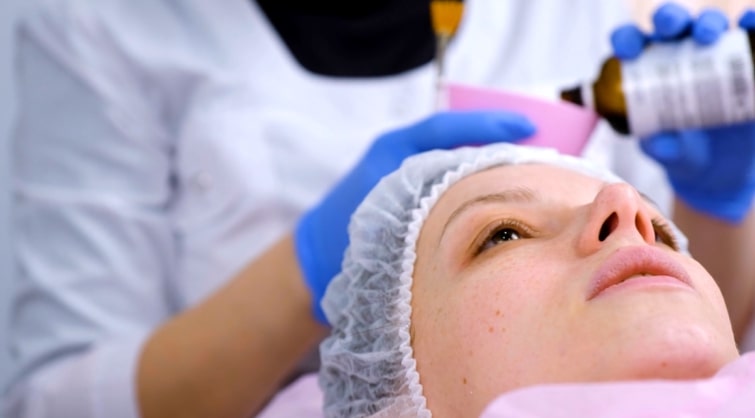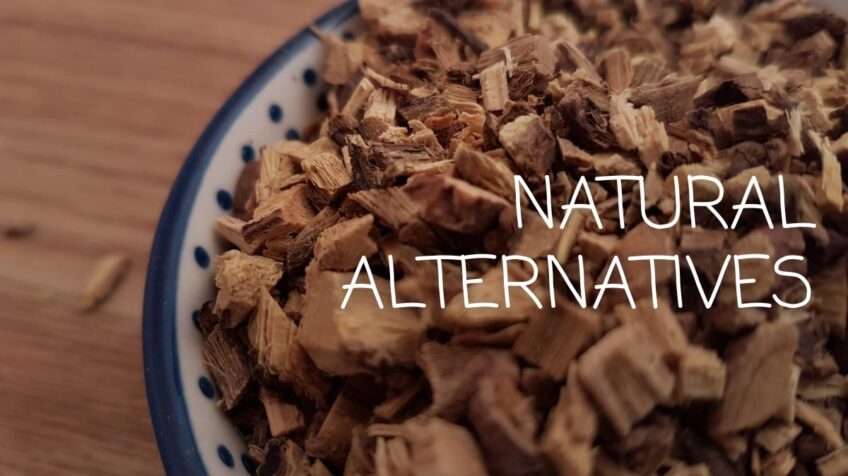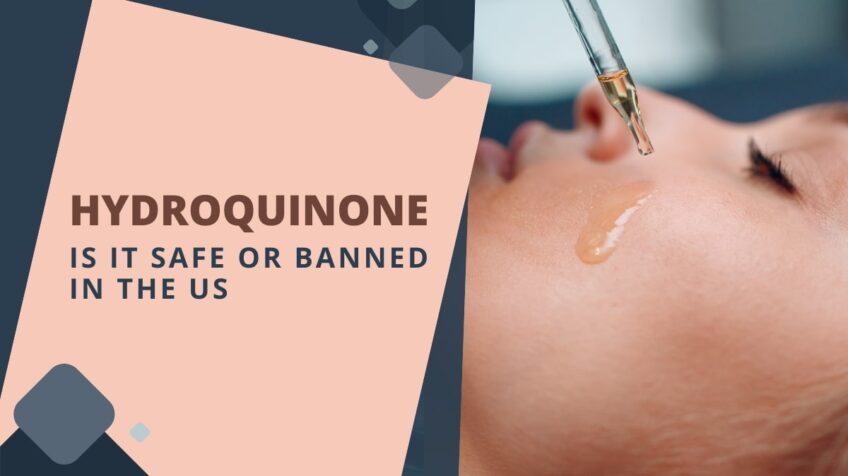Hydroquinone is a popular skin-lightening ingredient found in many beauty and skincare products. However, there have been concerns about the safety and effectiveness of this chemical, leading to questions about its status in the US. Many people are wondering if hydroquinone is banned in the US due to its potential health risks.
In this article, we’ll explore the facts about hydroquinone, its uses, its potential side effects, and whether or not it is banned in the US. By understanding the truth about hydroquinone, you can make informed decisions about the skincare products you use and ensure the safety and health of your skin.
What is Hydroquinone?
Hydroquinone is a skin-lightening agent that is commonly used to treat hyperpigmentation, age spots, and other forms of skin discoloration. It works by inhibiting an enzyme responsible for the production of melanin, which is the pigment responsible for skin color. It has been found to be an effective treatment for uneven pigmentation, but it has also been associated with numerous side effects and long-term health risks.
It was first introduced into the US market in 1982 as a prescription medication. Since then, it has become widely available in over-the-counter products in concentrations ranging from 1% to 4%. These weaker formulations are generally considered safe and effective when used as directed. However, higher concentrations (over 4%) are not recommended due to safety concerns.
In 2006, the FDA proposed a ban on all hydroquinone products containing greater than 2% concentration due to potential carcinogenic risk; however, this proposal was withdrawn in 2011 after undergoing further review by the agency and expert panels.
Despite its availability in low-concentration OTC products throughout the US market, hydroquinone is prohibited by government regulation in some countries due to safety concerns related to long-term use or overexposure. These include several countries/regions such as Japan, Australia, and Europe (EU), where sales of products containing hydroquinone have been banned since 2001.
Uses of Hydroquinone
It has long been used as a skin lightener to treat dark spots, uneven skin tones, and blemishes. Also known as quinol, it works by interrupting the formation of melanin, a pigment that causes dark spots on the skin. It is usually applied topically as a cream, although it is sometimes prescribed in a higher percentage or in capsule form or administered intravenously as part of an aggressive treatment plan.
Hydroquinone has been used effectively to lighten sun-induced and melasma-related freckles. It can also be found in products designed to treat age spots and other dark patches due to aging, chemical exposure, or scarring. Additionally, it is an important component of medical treatments for acne and rosacea, two conditions that can cause discolorations on the face.
Because it has sometimes been abused for cosmetic purposes, hydroquinone is regulated by federal law and its use may be restricted in some states. In 2006 the United States Food & Drug Administration (FDA) proposed a ban on hydroquinone due to potentially harmful side effects when used in large doses over long periods of time such as skin thinning and liver toxicity, although this ban was never passed into law in the US.
FDA Regulations on Hydroquinone

Hydroquinone is a topical skin-lightening agent that has been used for many years to treat dark spots and skin pigmentation. In the United States, it is only available with a prescription.
The FDA has made several attempts to ban the ingredient in skin care products, including a 2006 proposed ban that was overturned in court.
This section will look at the FDA regulations on it and its current status in the US.
While investigating the safety of hydroquinone in the US, you may also want to explore our comprehensive article discussing the safety of various makeup products to ensure your beauty routine is both effective and harmless.
FDA’s stance on Hydroquinone
Hydroquinone is a commonly used ingredient in skin-lightening and anti-aging products. In the United States, it is regulated by the Food and Drug Administration (FDA). The FDA does not prohibit the sale of cosmetic products containing hydroquinone but does regulate its use.
The FDA limits the amount of hydroquinone that can be used in over-the-counter (OTC) skin-bleaching drugs to two percent or less per concentration. Additionally, these types of drugs may only be sold as part of an OTC drug product marketed with appropriate labeling. This labeling must include a boxed warning describing the potential risks associated with using it.
In addition to these labeling requirements, OTC skin bleaching products containing a concentration of more than one percent hydroquinone must also contain other active ingredients to reduce any risk posed by hydroquinone use. Products that contain amounts greater than two percent hydroquinone must be available by prescription only and have specific warnings associated with their use.
The FDA also prohibits oral usage of any product that contains more than one point five percent hydroquinone, making all oral applications of this chemical illegal in the US.
Hydroquinone Concentration Limits
The Food and Drug Administration (FDA) has established concentration limits for hydroquinone and other ingredients in over-the-counter (OTC) skin-lightening products. According to current regulations, OTC skin-lightening products should not contain more than 2% hydroquinone. Studies suggest that concentrations beyond 2% can cause significant health problems if used long-term.
Certain states have also banned sales of products with higher concentrations of hydroquinone. It’s important to read the labels on these products carefully and make sure they do not exceed 10% concentrations. Exposure to higher concentrations of this compound can significantly increase risks of adverse effects such as skin irritation, dryness, redness, and burning.
At present, there are no other known ingredients approved by the FDA for use in lightening the color of human skin. Therefore it is important that you take into consideration all safety factors before using any product containing hydroquinone or any other active ingredient that may be declared as a lightener or fade cream.
Hydroquinone Bans in the US
It is a popular skin-lightening agent often found in cosmetics, however, it has been banned in the United States because of safety concerns.
In 2006, the FDA proposed a ban on over-the-counter hydroquinone products, and in 2016, the FDA finalized its ban.
Let’s talk about the history of hydroquinone bans in the US.
State-level bans
The United States has not implemented any uniform hydroquinone ban across the entire country, although some individual states have enacted their own legislation. For example, California and Hawaii have placed limits on hydroquinone use in cosmetics.
In California, concentrations of Two Percent (2%) or higher are prohibited for over-the-counter use in any cosmetic product. In Hawaii, there is a ban on any product with a concentration level greater than Two Percent (2%).
Other states have implemented restrictions or warnings regarding hydroquinone-containing products:
Arkansas: Restricts use of Seven Percent (7%) and higher; requires physician supervision in all cases. -Mississippi: Requires a special permit to purchase products containing Four point Five Percent (4.5%) and higher; users must be kept on log book/registry/list -New Hampshire: Requires warning labels on all cosmetic products containing more than Two Point Five Percent (2.5%).
Meanwhile, there are currently no hydroquinone-specific bans in Maryland, Virginia, and Washington state but it’s important to note that retailers can still refuse to sell certain skin care products based on individual store policies.
Federal-level bans
Though there have been no federal-level bans on hydroquinone in the United States, certain states have taken it upon themselves to restrict or ban the sale of products with hydroquinone. In 2006, Connecticut became the first state to nationally ban the over-the-counter use of products containing hydroquinone.
Since then, some other states have also passed restrictions and several companies and distributors voluntarily agreed to stop selling products with large concentrations of hydroquinone in them.
At the federal level, legislation was proposed in 2007 and again in 2009 but failed to pass. Additionally, the U.S. Food and Drug Administration (FDA) decided not to automatically classify hydroquinone as a “generally recognized as safe” ingredient due to potential adverse effects such as burning and stinging sensations in people who are sensitive or allergic to it and potential carcinogenic properties that may be associated with long term use. As a result, though not technically banned at a federal level, some retailers may avoid selling products that contain hydroquinone because of consumer safety concerns.
Alternatives to Hydroquinone

If you are looking for alternatives to hydroquinone, there are a few available that may work just as effectively. Let’s explore some of the potential alternatives.
Natural alternatives
For individuals looking for alternatives, there are a variety of natural ingredients found in over-the-counter products that lighten and brighten skin safely and effectively.
- Azelaic acid is one such ingredient, derived from grains such as wheat, rye, and barley. It reduces the amount of melanin produced by lightening discoloration, inhibiting tyrosinase activity, and blocking the receptor sites for melanin1. Azelaic acid can be found at concentrations of 5%-20%, but higher concentrations are sold with a prescription.
- Kojic acid is another popular alternative — it is an offshoot of the Japanese rice wine industry and works by preventing melanin formation in the deepest layers of epidermal skin cells2. Kojic acid can be found in a variety of concentrations between 1% – 4%, however, it can cause sensitivities or skin irritation if used incorrectly or left on for too long so it’s important to read instructions carefully when using.
- Licorice Extract (glabridin) is an extract from licorice root that has been demonstrated to inhibit tyrosinase activity3, therefore, reducing the formation of melanin which ultimately results in a lighter complexion. This extract can be found in various forms including pills, creams, and gels — all with varying concentrations typically between 4%-5%.
- Alpha arbutin — this ingredient prevents tyrosine from catalyzing into pigmented molecules4 due to its high resistance against oxidation when exposed to sunlight. Alpha arbutin can be found at varying strengths ranging from 2%-10%.
Over-the-counter products
Over-the-counter products are a great alternative to hydroquinone for those looking to reduce the appearance of dark spots, acne scars, and hyperpigmentation. There are several types of over-the-counter skincare products on the market today that can help restore clarity and brightness to your skin – both naturally and safely.
Vitamin C serums are an effective way to treat hyper/hypopigmentation and promote an even skin tone. Vitamin C is an antioxidant that can help protect against free radical damage while also providing brightening benefits, making it a popular choice in many anti-aging formulations. Vitamin C works best when it is used at a concentration of 10% or higher, so be sure to read product labels before purchasing.
Other brightening ingredients such as aloe vera, sea buckthorn oil, licorice root extract, and mulberry bark extract have also become popular alternatives for treating hyperpigmentation or dark spots. These plant extracts contain antioxidants that can help reduce inflammation and lighten existing pigment without causing any long-term damage to your skin.
They’re also considered safe for all skin types and most people with sensitive skin find that they don’t experience any irritation when using these natural ingredients.
In our previous article, we discussed a shocking incident involving a college intern who had an eye-opening experience with the dangers of toxic cosmetics, which highlights the importance of understanding the safety of ingredients like hydroquinone.
FAQs
How long does it take to see results from using hydroquinone?
It may take several weeks or even months of consistent use to see results from using it on the skin.
Can hydroquinone be used on all skin types?
It may not be suitable for all skin types, and it is best to consult with a dermatologist before using any products containing hydroquinone.
How often should hydroquinone be applied to the skin?
It should be applied to the skin as directed by the product packaging or as recommended by a dermatologist.
Can hydroquinone be used in combination with other skincare products?
Hydroquinone can be used in combination with other skincare products, but it is best to consult with a dermatologist to determine the best regimen for your specific skin type and concerns.
Does hydroquinone make the skin more sensitive to the sun?
Yes, it can make the skin more sensitive to the sun, so it is recommended to use a broad-spectrum sunscreen daily when using products containing this compound.
Can hydroquinone be used to treat acne scars?
It can be used to treat acne scars, but it is best to consult with a dermatologist to determine the best treatment plan for your specific needs.
Here are some tips on getting rid of acne scars:
Is there a natural alternative to hydroquinone for skin lightening?
Yes, there are natural alternatives for skin lightening, such as vitamin C, kojic acid, and licorice root extract.
Are there any potential long-term effects of using hydroquinone on the skin?
There is limited research on the long-term effects of using it on the skin, and it is recommended to use products containing hydroquinone as directed and to consult with a dermatologist for any concerns.
Conclusion
After looking at the evidence, it is clear that Hydroquinone has been banned in the US by the FDA. It is illegal to use or sell these products in the United States or distribute them in any other country.
Consumers must be aware of any products that contain Hydroquinone, as these could pose a health risk. It’s important for consumers to be informed about the potential risks of any products they use or purchase.

